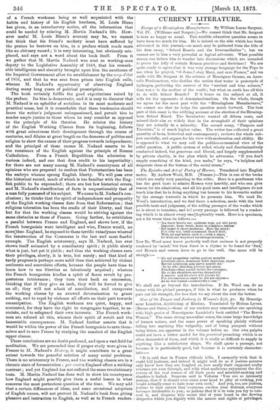CURRENT LITERATURE.
Essays of a Birmingham Manufacturer. By William Lucas Sargant. Vol. IV. (Williams and Norgate.)—We cannot think that Mr. Sargent is here as happy as usual. This terrible-education question seems to have been too much for him. He is indeed on the side which has been advocated in this journal,—so much may be gathered from the title of his first essay, School Boards and the Irreconcilables "; but we cannot see in him a very powerful or logical advocate. What possible reason can induce him to wander into discussions which are intended to prove the folly of certain Roman practices and doctrines ! We are quite ready to agree that it was very strange language for the Pope to use when he prayed, "0 Jesus ! obey Mary, and save France," and we smile with Mr. Sargant at the science of Monsignor Gaume, an Apos- tolic Prothonotary, who derides the notion that water is protoxyde of hydrogen, preferring the answer of the "ancient and true science," that water is the mother of the world ; but what on earth has all'this to do with School Boards ? If it bears on the subject at all, it tells for the opponents of denominationalism. On the whole, though we agree for the most part with the "Birmingham Manufacturer," wo cannot see that he helps the question much forward. The best part of this essay is the edifying account of the election of the Birming- ham School Board. Tho Secularists wanted all fifteen seats, and missed their aim so widely that in the stronghold of their opinions they are actually in a minority. The second essay, "Paupers and Theorists," is of much higher value. The writer has collected a great quantity of facts, historical and contemporary; reviews the whole sub- ject carefully, and argues for his view with moderation and ability. He is opposed to what we may call the politico-economical view of the relief question. A public system of relief. wisely and discriminatively conducted indeed, but generous and liberal, and largely srqpplemented by private charity, is the plan which he advocates. "If you don't supply something of the kind, you make," he says, "a helpless and desperate class at the bottom of the social-strata."






































 Previous page
Previous page